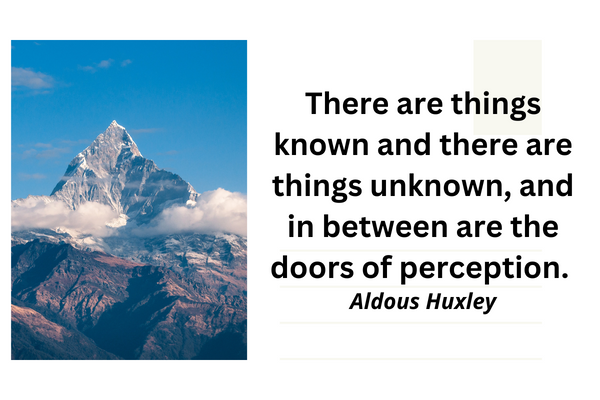In order to try and understand the Theory of Perception, we will first look at the meaning of both Subject & Object. Subject means the knower, perceiver or doer of an action. Object is the known, perceived or receiver of the action. If I am perceiving a mountain, then I am the perceiver or the subject & the mountain is the perceived or the object. Theory of Perception therefore deals with how we understand the external world and involves the relationship between perceiving subject (individual or consciousness) and the perceived object (things related to the external world).
Now, there continues to be a tussle between the Realists & the Idealists. They are opposed to each other’s views. Their arguments & counter arguments go on & on. We will now try & understand what is Idealism & Realism. Of course, there are many other philosophical theories of perception, but we will limit it to these two only.
Idealism:
Western philosophers regarded the mind as the subject. Plato said that “Reality is created by our mind and we can change reality by changing our mind”. The physical world around is not real – it is an illusion and is constantly changing. It is the mind & thoughts that projects the outside world. “I think, therefore I am” said René Descartes. What he meant is that the very act of thinking, doubting & questioning one’s own existence proves that one exists.
Berkeley said “All reality is mind dependent”. In other words, what he says is external objects exist because of the mind that is perceiving them. So for the Idealists, when the mind is absent, you do not perceive the world. Our senses no doubt perceive the world, but cannot do so without the mind. As the mind is located in the subject, it is the subject which is given prime importance, not the object.
Realism:
For a Realist, the world exists independent of our conscious mind. All that we see around us is real, the mountains, sea, trees, sun & the moon etc. So for them, it is the Object that is of prime importance and not the Subject (Mind). This is the opposite for what Idealists say. The perceived objects exist independently of the perceiver, and our sensory experiences accurately represent these objects as they are. Realists argue that these objects always exist even if our minds do not perceive them.
Vedantic View of Perception:
In summary, the Idealists say that the only Mind and thoughts are required to perceive this world. Object has no role in it. Realists say that the action of the Object creates the world. Mind or Subject has no role in it.
In the Vedantic view both Idealism & Realism are interdependent. They cannot be independent of each other. The supreme reality – Brahman is all pervading, it exists both in the subject & object. It is the substratum of everything. It is illusion or MAYA that creates multiplicity and diversity in this world and causes us to think that the world is separate and distinct, but in reality it is just an expression of the Supreme Brahman.
The subject is a part of the created world where the object is also located and vice-versa. Both the subject (mind) & the world (object) that is perceived are a part of the same creation! So both the Subject – Knower & Object – Known are required for producing this magnificent world, while all the time the Supreme Brahman remains changeless.
Ultimately, according to Vedanta, the true nature of reality is non-dual, where the perceiving subject (Atman) and the perceived object are interconnected and are manifestations of the same ultimate reality (Brahman). The goal of Vedanta is to realize this non-dual truth and transcend the illusion of duality.
Swami Rama Thirtha says; Strike a match on sand paper and a flame is produced. Now the flame was not in the match nor in the sand paper, but the coming together of both produced the flame. Similarly clapping both hands produces sound. Sound is neither in the right hand or the left, but is a result of two hands coming together. Therefore, when the subject meets the object, the phenomenal world springs forth!
The above implies that the perceptions of our world are limited by our senses. There is infinite amount of knowledge that we are unable to access through our normal means of perception!
My next blog will be on MAYA or Illusion…Meanwhile, please watch a short You Tube video for a brief understanding of Perception as per Vedanta (<click here)
Reference: Few Snippets from Vedanta Treatise – The Eternities by Swami Parthasarathy
